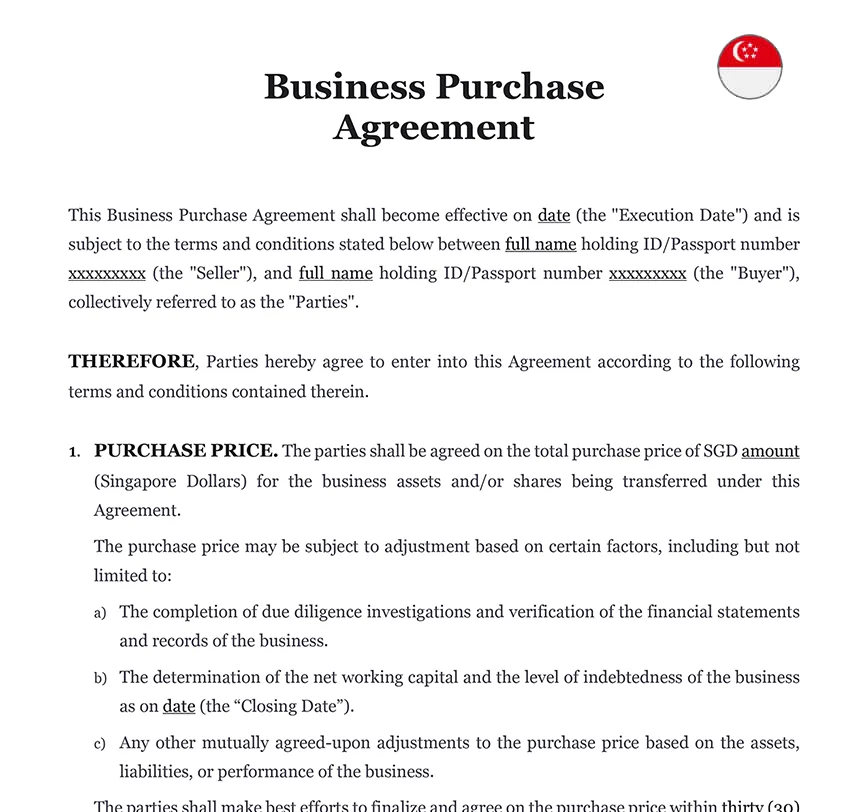Ready to use legal template
Drafted by experienced lawyers
Compliant with Singapore law
Ready to use legal template
Drafted by lawyers
Compliant with Singapore law
Home › Business contract › Business Purchase Agreement
Learn more about Business Purchase Agreement in Singapore
Looking to buy or sell a business? Themis Partner has you covered with our easy-to-edit legal template for a Business Purchase Agreement. Our template is drafted by experienced lawyers in Singapore, ensuring full compliance with the law and providing comprehensive protection for both the buyer and the seller. From outlining the rights and obligations of each party to specifying the terms of the transaction, our Business Purchase Agreement template covers all essential aspects of the deal. Streamline the process and safeguard your interests with our trusted and customizable template.
Table of contents
-
What does a Business Purchase Agreement entail in Singapore?
-
What does a Business Purchase Agreement include
-
How does it protect the rights the buyer and the seller?
-
How does it address non-compete and non-disclosure clauses?
-
How does it address the transfer of assets and liabilities?
-
What is the difference with a Share Purchase Agreement?
-
What if I don’t have a Business Purchase Agreement?
What does a Business Purchase Agreement entail in Singapore?
Business Purchase Agreement in Singapore is a legal document that outlines the terms and conditions of the sale and purchase of a business. It serves as a comprehensive contract between the buyer and the seller, detailing various aspects of the transaction. The agreement typically includes information about the parties involved, the purchase price, the assets and liabilities being transferred, and any specific conditions or warranties. It also covers matters such as the allocation of risks, the transfer of intellectual property rights, non-compete clauses, and dispute resolution mechanisms. It ensures that both parties are aware of their rights and obligations, providing a solid foundation for a smooth and legally sound business acquisition in Singapore.
What does a Business Purchase Agreement include?
1. Parties Details
The agreement identifies the buyer and the seller, including their legal names and addresses.
2. Purchase Price
The agreement specifies the purchase price for the business, including the currency and any payment terms or installment arrangements.
3. Assets and Liabilities
It outlines the specific assets and liabilities being transferred as part of the transaction, such as tangible assets (e.g., equipment, inventory) and intangible assets (e.g., intellectual property, customer lists).
4. Conditions and Warranties
The agreement may include conditions that need to be fulfilled before the sale is finalized, such as obtaining necessary approvals or licenses. It may also outline warranties and representations made by the seller regarding the business’s financial and operational status.
5. Payment Terms
This section covers the terms and schedule of payment, including any down payment, installment payments, or financing arrangements.
6. Allocation of Risks
The agreement addresses how risks associated with the business, such as pending legal disputes or tax liabilities, will be allocated between the buyer and the seller.
7. Non-Compete and Non-Disclosure
It may include provisions restricting the seller from competing with the business or disclosing confidential information to third parties.
8. Transition Period
If applicable, the agreement may outline a transition period during which the seller assists the buyer in the smooth transfer of operations and customer relationships.
9. Dispute Resolution
This section defines the mechanism for resolving any disputes that may arise, such as arbitration or mediation.
10. Governing Law
The agreement specifies the jurisdiction whose laws will govern the interpretation and enforcement of the agreement.
How does it protect the rights the buyer and the seller?
| ➤ It clearly outlines the terms and conditions of the sale, ensuring that both parties have a mutual understanding of their rights and obligations. |
| ➤ It specifies the assets and liabilities being transferred, preventing any misunderstandings or disputes regarding what is included in the sale. |
| ➤ It also includes provisions for warranties and representations made by the seller, ensuring that the buyer receives accurate and truthful information about the business's financial and operational status. |
| ➤ It may allocate risks between the buyer and the seller, protecting each party from unforeseen liabilities or legal disputes that may arise post-transaction. |
| ➤ Non-compete and non-disclosure clauses can safeguard the seller's proprietary information and prevent them from competing with the business being sold. |
| ➤ It provides a mechanism for resolving disputes, such as arbitration or mediation, which helps protect the rights of both parties by providing a fair and structured process for resolving conflicts. |




